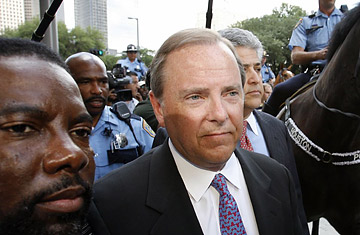
Former Enron CEO Jeffrey Skilling leaves the Bob Casey U.S. Courthouse in Houston with his attorney Daniel Petrocelli after his fraud and conspiracy trial on May 25, 2006
The fall of Enron, the energy-trading behemoth that imploded in 2001, was abrupt and bloody. It stunned investors, wiped out its employees' retirement accounts and created a whole new chapter in the history of corporate skulduggery.
But the fallout from the company's demise is still far from over. Enron's financial dealings were so intricate that it took four years for the Justice Department to complete the investigation that led to charges against the company's top executives. One of those was former CEO Jeffrey Skilling, who was convicted in 2006 of 19 counts of conspiracy, securities fraud and insider trading and is currently serving a 24-year term in a minimum-security prison in Waseca, Minn. Now Skilling could have parts of his conviction overturned by the Supreme Court, and in the process, possibly limit the use of a criminal law that critics say gives prosecutors too much latitude.
The Justices agreed last week to hear his appeal largely because Skilling asked them to examine an issue they've taken a decided interest in lately — the proper use of the charge "honest services fraud." A 1988 revision to the Federal Wire and Mail Fraud Statute makes it a crime to undertake a "scheme or artifice to deprive another of the intangible right of honest services" — in other words, the standards of upright behavior that one is entitled to expect of business people and public officials. In recent years, that law has been used to help convict some very visible defendants, including the Washington lobbyist Jack Abramoff and California Representative Randy (Duke) Cunningham.
Critics of the law say it unfairly gives prosecutors a way to bring vague charges when they can't build a case for more conventional crimes like bribery. "It's been very, very broadly applied," says Patricia Pileggi, a former U.S. prosecutor who is now an attorney with the firm Schiff Hardin in New York. "It's useful to prosecutors because they are not required to prove that somebody got a tangible, monetary benefit" from their actions.
Or as one persistent critic of the statute put it: "Without some coherent limiting principle to define what 'the intangible right of honest services' is, whence it derives, and how it is violated, this expansive phrase invites abuse by headline-grabbing prosecutors."
That critic was Supreme Court Justice Antonin Scalia, writing in February to dissent from the court's decision not to hear the appeal of three Chicago city officials who were convicted under the statute. Given that lower courts have been in sharp disagreement about what honest-services fraud means, Scalia added, "It seems to me quite irresponsible to let the current chaos prevail."
It looks now like the court is ready to sort out the confusion, or at least try to. In addition to Skilling's appeal, the Justices have agreed to hear two other cases this term that challenge how prosecutors have been using the law, a clear sign that they hope to clarify the reach of an elastic statute.
At Skilling's trial, much of the prosecution's case rested on the claim that he had committed honest-services fraud by lying to investors and Enron employees to disguise the deep financial trouble that the company was in. In his appeal, Skilling argued that the charge should be brought only against defendants who are suspected of scoring tangible personal gains at their employer's expense. Whatever he may have done during the rise and fall of Enron, Skilling said in his appeal, "the government conceded that his acts were not intended to advance his own interests instead of Enron's." In January a federal appeals court upheld Skilling's conviction and refused to accept his interpretation of the law.
